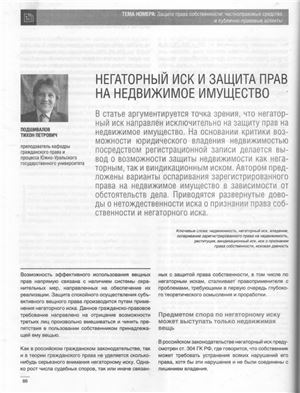// ЗАКОН. – 2011. – №
1. – С. 86-95. В статье аргументируется точка зрения, что негаторный иск направлен исключительно на защиту прав на недвижимое имущество. На основании критики возможности юридического владения недвижимостью посредством регистрационной записи делается вывод о возможности защиты недвижимости как негаторным, так и виндикационным иском. Автором предложены варианты оспаривания зарегистрированного права на недвижимое имущество в зависимости от обстоятельств дела. Приводятся развернутые доводы о нетождественности иска о признании права собственности и негаторного иска. Ключевые слова: недвижимость, негаторный иск, владение, оспаривание зарегистрированного права на недвижимость, реституция, виндикационный иск, иск о признании права собственности, исковая давность. Podshivalov Tikhon. Negatoy claim and protection of the rights for real estate // LAW. – 2011. – N.
1. – Page 86-95. In article the point of view is reasoned that the negatoy claim is directed only on protection of the rights for real estate. On the basis of criticism of possibility of legal seizing by means of registration record the conclusion about possibility of protection of real estate is drawn by both the negatoy, and vindikatsionny claim. The author offered options of contest of the registered right for real estate depending on facts of the case. The developed arguments about not identity of the claim for recognition of the property right and the negatoy claim are given. Keywords: real estate, the negatoy claim, possession, contest of the registered right for real estate, a restitution, the vindikatsionny claim, the claim for recognition of the property right, limitation period. Tikhon Podshivalov graduated magna cum laude from Law faculty of the South Ural State University (Chelyabinsk, Russia) with a degree in jurisprudence. Since 2008th he is a lecturer of Civil Law and Process department. He holds such courses as «Russian Civil Law», «Private Inteational Law», and «Theory of Property Rights». In 2011th he defended his thesis on the topic of «Negatory action» in the Dissertation Council of the Saratov State Academy of Law, specialty
12.00.03. The basic idea of the dissertation research was to justify the fact that negatory action is not a universal way to protect property rights. Since 2012 he has been a member of the Russian Association of Inteational Law. In 2014 the Ministry of Education and Science of the Russian Federation awarded him the rank of associate professor in the specialty «Civil law; Business law; Family law; Private inteational law». Research interests - the problems of property rights protection, objects of civil rights and immovable property, the implementation of the principle of good faith (pre-contractual liability, the prohibition of circumvention of the law, estoppel, the doctrine of lifting the corporate veil, the abuse of civil rights), private inteational law. The main focus of the research is to elaborate a system of real action under the conditions of reforming the civil legislation of the Russian Federation and the changes in judicial practice, including with respect to immovable property.
1. – С. 86-95. В статье аргументируется точка зрения, что негаторный иск направлен исключительно на защиту прав на недвижимое имущество. На основании критики возможности юридического владения недвижимостью посредством регистрационной записи делается вывод о возможности защиты недвижимости как негаторным, так и виндикационным иском. Автором предложены варианты оспаривания зарегистрированного права на недвижимое имущество в зависимости от обстоятельств дела. Приводятся развернутые доводы о нетождественности иска о признании права собственности и негаторного иска. Ключевые слова: недвижимость, негаторный иск, владение, оспаривание зарегистрированного права на недвижимость, реституция, виндикационный иск, иск о признании права собственности, исковая давность. Podshivalov Tikhon. Negatoy claim and protection of the rights for real estate // LAW. – 2011. – N.
1. – Page 86-95. In article the point of view is reasoned that the negatoy claim is directed only on protection of the rights for real estate. On the basis of criticism of possibility of legal seizing by means of registration record the conclusion about possibility of protection of real estate is drawn by both the negatoy, and vindikatsionny claim. The author offered options of contest of the registered right for real estate depending on facts of the case. The developed arguments about not identity of the claim for recognition of the property right and the negatoy claim are given. Keywords: real estate, the negatoy claim, possession, contest of the registered right for real estate, a restitution, the vindikatsionny claim, the claim for recognition of the property right, limitation period. Tikhon Podshivalov graduated magna cum laude from Law faculty of the South Ural State University (Chelyabinsk, Russia) with a degree in jurisprudence. Since 2008th he is a lecturer of Civil Law and Process department. He holds such courses as «Russian Civil Law», «Private Inteational Law», and «Theory of Property Rights». In 2011th he defended his thesis on the topic of «Negatory action» in the Dissertation Council of the Saratov State Academy of Law, specialty
12.00.03. The basic idea of the dissertation research was to justify the fact that negatory action is not a universal way to protect property rights. Since 2012 he has been a member of the Russian Association of Inteational Law. In 2014 the Ministry of Education and Science of the Russian Federation awarded him the rank of associate professor in the specialty «Civil law; Business law; Family law; Private inteational law». Research interests - the problems of property rights protection, objects of civil rights and immovable property, the implementation of the principle of good faith (pre-contractual liability, the prohibition of circumvention of the law, estoppel, the doctrine of lifting the corporate veil, the abuse of civil rights), private inteational law. The main focus of the research is to elaborate a system of real action under the conditions of reforming the civil legislation of the Russian Federation and the changes in judicial practice, including with respect to immovable property.

